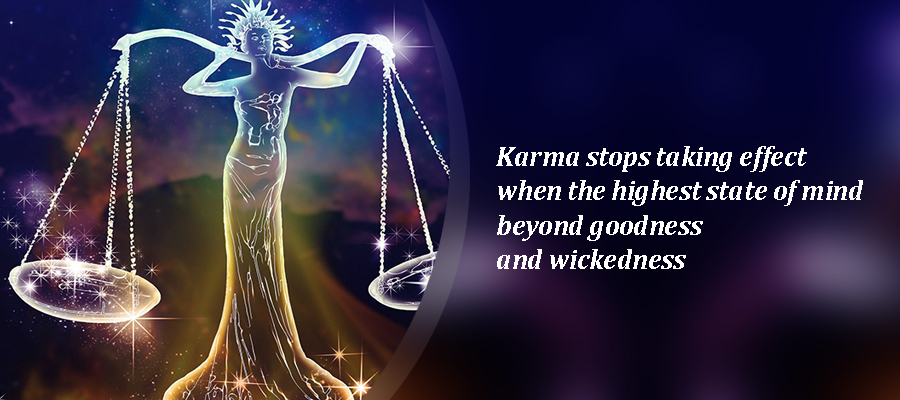The term “Karma” appears frequently in various philosophical and religious writings. Indeed, it has been discussed so often by the Sages and Yogis that many consider it an imaginary stumbling block on the path of spiritual salvation. All Masters, from a lower level or from a level of ascent, speak of liberation through action without clinging and craving for its fruit or results.
The mind is accustomed to tasting the fruits of its actions. How do you break this habit? Sadhana (i.e. mental and physical practice) can be used as an instrument to discipline the mind to some extent. But in the long run, the mind’s habit of enjoying its experiences will show itself. The mind can give up worldly pleasures only when it has higher pleasures.
Saints have experienced an even more wonderful pleasure which is ecstatic bliss – through contact with the Word of God (OM). After being absorbed in this OM Sound Stream, the mind is pulled away from the world. The mind has a habit of chasing worldly things and jumping from one thing to another. So, what we have to do is not to stop the flux which is in its nature, but only to change its direction from the bottom to the outside world to the inside.
This means tapping into a wandering intelligence and channeling mental energy down the right paths to ensure lasting and permanent results. This comes through regular exercise or OM absorption. This is the only method by which the mind can be gradually trained and ultimately rendered harmless by the sublimation of mental currents; the soul becomes its own and can continue unencumbered and unhindered on its way to its original source: Extraordinary Soul or Whole Soul. Thus, the Saints Who Own Himself through this Path – Mantra Yoga (absorption in Prenava OM) – can also not only enable us to free ourselves from the karmic cycle of action and reaction but also give us an access to the existing Divine Kingdom. inside it.
Now the question arises: How can karma be dissolved or made ineffective?
In the maze of Nature’s laws, in which we are inseparably involved, there is a way out provided for those who are truly seeking the knowledge of Self (Jiva) and knowledge of God (Brahman). The access to this exit or the Way out of the dense forest of Karma that spreads far back into the past was made real by the True Master’s saving grace. Once He has brought us into His stable and contacted us with the eternal Holy Word, we are beyond the reach of the Yama or the angel of death who represents the negative aspects of the Supreme Power and the giver of justice in the universe, for each according to his actions.
Any act of a living being that is consciously or unconsciously performed, regardless of whether it is still in the latency stage or thought form, mental vibration, or is spoken by word of mouth or is actually done by physical action, constitutes Karma.
So that the reader does not get confused with the term “Karma”, it is better to understand this word in a proper context.
Originally, the word Karma meant and represented sacrificial rites and rituals, and the yajna performed by individuals as prescribed by the sacred Vedic texts. However, then, it includes all kinds of virtue, social and self-purification, such as honesty, chastity, abstinence, continuity, ahimsa, universal love, selfless service and all acts of a charitable and philanthropic nature. In short, great emphasis is placed on developing Atma-Guna which tends to discipline the mind and divert mental powers in the right direction, so as to serve the higher purpose of liberating the Atman or Jiva from attachments.
Karma is generally classified as prohibited, permitted and prescribed. All karma that is degrading in nature is classified as forbidden because indulging in evil is sin and misery and even death. This is called Kukarma or Vikarma.
Next is Karma which enhances and helps one attain higher states like Heaven. This is Sukama Karma, which is karma that is done to fulfill one’s desires and aspirations for virtue and is therefore permitted or permitted. Finally, we have Karma whose performance is considered obligatory as ordered by the scriptures for people belonging to different groups or social orders (Brahmins or classes of priests involved in the study and teaching of scriptures, Kshatriya or a warrior race consisting of forces combat for defensive purposes, Vaishya or people involved in commercial or agricultural pursuits, and the Sudras or people who served the previous three classes).
At different stages in one’s life are called Ashrams (Brahmcharya, Grehastha, Vanprastha and Sanyas correspond roughly to the formation period of one’s education, the stage of family life who is married as a householder, the ascetic stage of an ascetic or an ascetic who engages in deep meditation in the silence of the forest. and finally the stage of a spiritual pilgrim giving people the fruits of his lifetime experience, each serving is 25 years counting the life span to be 100 years in duration). This is called Netya Karma or Karma whose performance is a “must” for each day of his vocation and period of his life.
As a moral code of ethics, the law of Karma makes a valuable contribution to the material and moral well-being of humans on earth and opens the way to a better life in the future. In the four spheres of human life – secular, material or economic, religious and spiritual, as denoted by the term Kama (fulfillment of one’s desires); Artha (economic and material well-being); Dharma (the moral and religious basis that upholds and supports the universe); and Moksha (salvation) – action or karma plays an important role. Of course, it is moral purity that becomes the driving force for achieving success in one’s endeavors. In order for karma to produce the desired fruit, it needs to be done with sincere and directed attention and loving devotion.
Apart from this, there is another form of Karma which is Nish-Kama Karma, that is, Karma which is practiced without clinging, or desire for its results. It is superior to all other forms of karma which are more or less a source of bondage, but it helps a little to free a person from karmic bonds but not from the effects of karma.
However, it can be noted that Karma itself does not have any binding effect. Only Karma born of desire or Karma leads to slavery. Hence, karma is the means and end of all human endeavor. It is through these karmas that one conquers karma and transcends karma. Any attempt to bypass the Law of Karma is as futile as stepping over one’s shadow. The highest of all is to be Neh-Karma or Karma-rest, that is to say, to do Karma according to God’s plan, as a God-conscious co-worker. It is action without action like a stationary point in the ever-turning wheel of life.
Again, the term “Karma” is a Sanskrit term that means action or deed, including mental vibrations, thoughts and word of mouth, while Karam is a Persian word meaning kindness, compassion, compassion or mercy.





